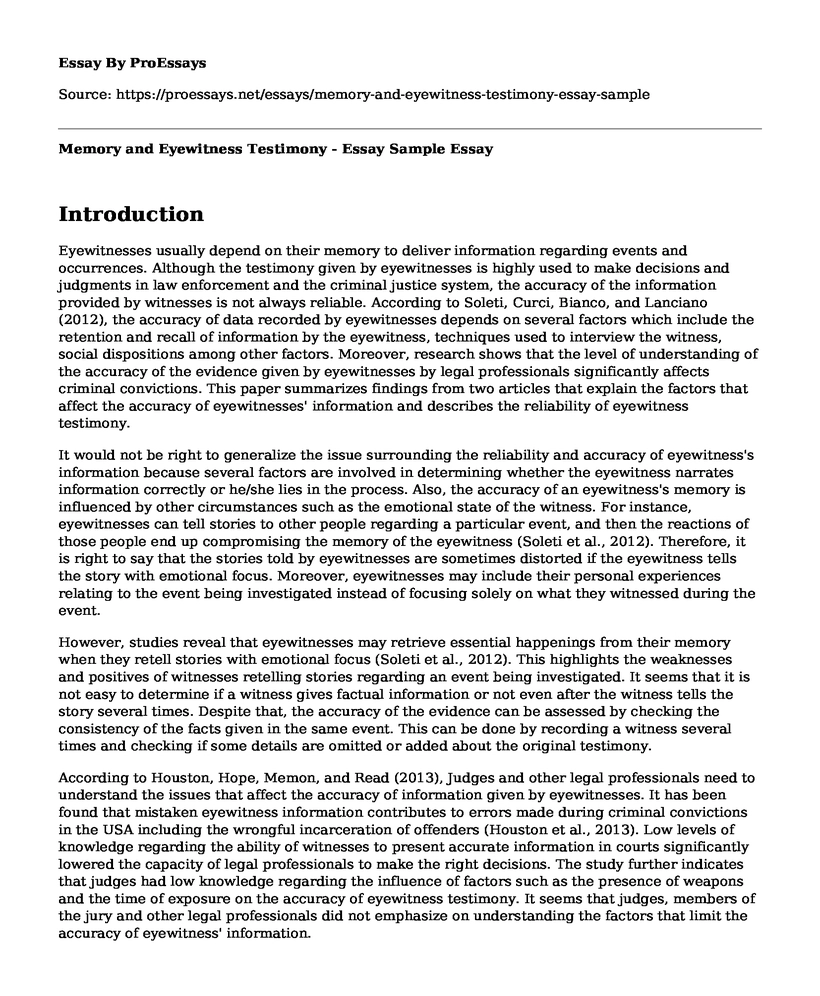Introduction
Eyewitnesses usually depend on their memory to deliver information regarding events and occurrences. Although the testimony given by eyewitnesses is highly used to make decisions and judgments in law enforcement and the criminal justice system, the accuracy of the information provided by witnesses is not always reliable. According to Soleti, Curci, Bianco, and Lanciano (2012), the accuracy of data recorded by eyewitnesses depends on several factors which include the retention and recall of information by the eyewitness, techniques used to interview the witness, social dispositions among other factors. Moreover, research shows that the level of understanding of the accuracy of the evidence given by eyewitnesses by legal professionals significantly affects criminal convictions. This paper summarizes findings from two articles that explain the factors that affect the accuracy of eyewitnesses' information and describes the reliability of eyewitness testimony.
It would not be right to generalize the issue surrounding the reliability and accuracy of eyewitness's information because several factors are involved in determining whether the eyewitness narrates information correctly or he/she lies in the process. Also, the accuracy of an eyewitness's memory is influenced by other circumstances such as the emotional state of the witness. For instance, eyewitnesses can tell stories to other people regarding a particular event, and then the reactions of those people end up compromising the memory of the eyewitness (Soleti et al., 2012). Therefore, it is right to say that the stories told by eyewitnesses are sometimes distorted if the eyewitness tells the story with emotional focus. Moreover, eyewitnesses may include their personal experiences relating to the event being investigated instead of focusing solely on what they witnessed during the event.
However, studies reveal that eyewitnesses may retrieve essential happenings from their memory when they retell stories with emotional focus (Soleti et al., 2012). This highlights the weaknesses and positives of witnesses retelling stories regarding an event being investigated. It seems that it is not easy to determine if a witness gives factual information or not even after the witness tells the story several times. Despite that, the accuracy of the evidence can be assessed by checking the consistency of the facts given in the same event. This can be done by recording a witness several times and checking if some details are omitted or added about the original testimony.
According to Houston, Hope, Memon, and Read (2013), Judges and other legal professionals need to understand the issues that affect the accuracy of information given by eyewitnesses. It has been found that mistaken eyewitness information contributes to errors made during criminal convictions in the USA including the wrongful incarceration of offenders (Houston et al., 2013). Low levels of knowledge regarding the ability of witnesses to present accurate information in courts significantly lowered the capacity of legal professionals to make the right decisions. The study further indicates that judges had low knowledge regarding the influence of factors such as the presence of weapons and the time of exposure on the accuracy of eyewitness testimony. It seems that judges, members of the jury and other legal professionals did not emphasize on understanding the factors that limit the accuracy of eyewitness' information.
It is challenging to establish the reliability of evidence provided by eyewitnesses if efforts are not made to understand factors that contribute to misleading information from witnesses. The most important aspect would be identifying the right witness and then assessing the quality of the evidence provided by the witness. According to Houston et al. (2013), most errors in convictions can be associated with the assumption by judges that common sense is the most crucial factor in determining the accuracy of eyewitness memory. It is helpful to focus on improving the knowledge base concerning the factors that influence the accuracy of information provided by eyewitnesses. Moreover, the techniques used to interview witnesses should also be considered. For instance, witnesses may be unable to understand questions meant for experts, and therefore, they end up giving contradicting information.
Conclusion
In conclusion, eyewitness information can be made reliable by focusing on eliminating factors that negatively influence the memory of the witness or which lower the ability of the witness to provide correct details of events witnessed. Judges and other legal professionals make wrong decisions because they do not examine the accuracy of witnesses' information. It should be understood that the memory of witnesses is affected significantly by age and situations such as the presence of weapons or other frightening conditions during the event. Furthermore, the manner in which witnesses are made to provide evidence also affects the accuracy of the information given. Witnesses should not be coerced, and simple language should be preferred during interviews.
References
Houston, K. A., Hope, L., Memon, A., & Read, J. D. (2013). Expert Testimony on Eyewitness Evidence: In Search of Common Sense. Behavioral Sciences and the Law, 637-651.
Soleti, E., Curci, A., Bianco, A., & Lanciano, T. (2012). Does Talking About Emotions Influence Eyewitness Memory? The Role of Emotional vs. Factual Retelling on Memory Accuracy. Europe's Journal of Psychology, 8(4), 632-640.
Cite this page
Memory and Eyewitness Testimony - Essay Sample. (2022, Jul 21). Retrieved from https://proessays.net/essays/memory-and-eyewitness-testimony-essay-sample
If you are the original author of this essay and no longer wish to have it published on the ProEssays website, please click below to request its removal:
- Why States Adopt Human Rights Treaties and Join Human Rights Organizations
- Research Paper on Human Rights in China and the United States
- Mass Shootings, Social Contract Theory, and the Sociology of the Media Essay
- Essay Sample on Gun Control: Advantages, Disadvantages, & Ethical Concerns
- Essay Sample on Shirin Ebadi: Nobel Peace Prize Winner & Human Rights Pioneer
- Born a Crime - Literary Analysis Essay
- Criminal Justice System: Inequities in US Society Persist - Research Paper







